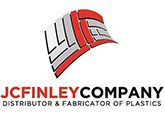Halar Fabricators
Our ProductsHalar Fabricators
The team at JC Finley are Halar fabricators specializing in Halar machining, Halar fabrication, and Halar distribution. As a Halar fabricator and Halar manufacturing company, we’ve been providing quality and specialized service to all of our customers in need of Halar plastic. Not sure where to begin? Contact our team to get started. As our saying goes, if you can dream it, JC Finley can make it.
Halar Attributes
Certainly the most attractive and unique attribute to JC Finley Halar ECTFE is its resistance to abrasive chemicals and corrosion resistance. Halar is remarkably strong and durable (again, comparable to Nylon) and highly resistant to wear and weathering. It possesses superior creep resistance and yields a finish much harder and smoother than other fluoropolymer coatings. Halar is an excellent insulator for electricity and performs well in extreme heat and extreme cold settings. These unique attributes make Halar ECTFE a favorite in a number of industrial application settings.
Halar Description
Developed in 1970 as a corrosion protection agent, Halar is the trade name for the copolymer ethylene chlorotrifluoroethylene (ECTFE), a material marketed by the Solvay Solexis company. A semi-crystalline fluoropolymer, Halar is used primarily as a strong and durable coating for metal components exposed to harmful chemicals and/or a high degree of friction (bearings or gears, for example). It is highly resistant to corrosion, chemical abrasion, and wear, making it one of the stronger fluoropolymers and an undisputed favorite in a variety of industrial applications. In addition to its resistance to harmful chemicals, JC Finley Halar performs admirably in both extreme cold (around -100oF) and extreme heat (around 300oF) and is resistant to flame.
In many respects, Halar shares several practical and key characteristics with another highly versatile and durable plastic: Nylon! Halar-coated products are smooth to the touch (unlike other fluoropolymer-coated materials) and, like Nylon, Halar fabricating, welding, bonding, and other altering can be done with relative ease for experienced Halar fabricators. Halar machining and Halar fabrication are both commonplace in the plastics industry. It can also be formed by way of injection or blow molding processes. Regarding Halar distribution and sales, the material is typically available in cut-to-size rods or sheets of varying thicknesses. For more on Halar fabrication, or to find out how it might benefit your business or operation, contact the JC Finley team.
We’re Here To Help Your Business
With Quality, Integrity & Innovation
